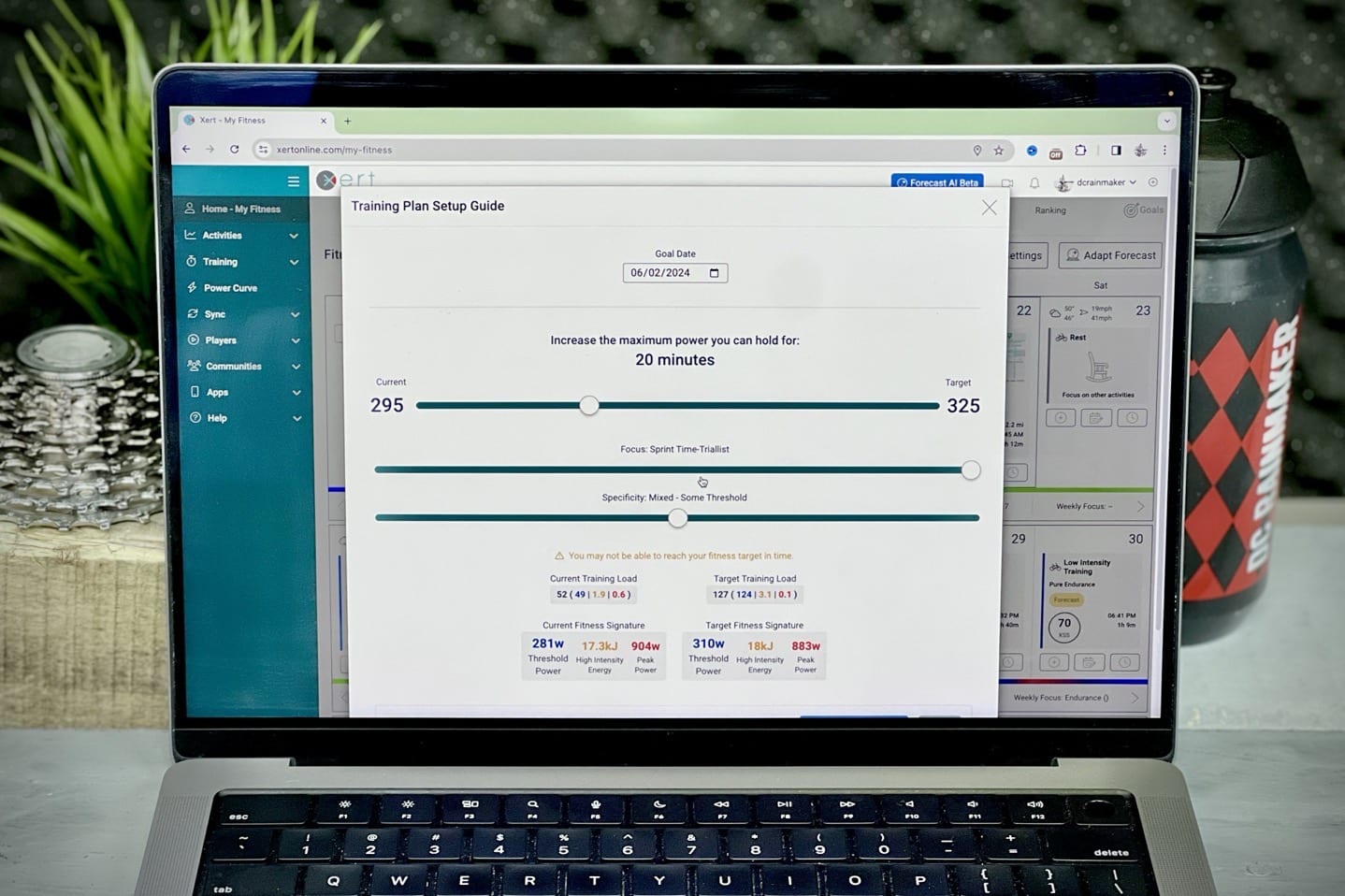
As we slide into the quiet period around the holidays and end of year, companies are doing their best to finish off projects. And one such project that Xert has launched into beta is their Forecast AI tool. Essentially, the tool allows you to pick a desired max power level duration (e.g. 20-minute max power) for a future date, and then it’ll build out an entire training schedule to try and get you to hit that goal. In other words, you can say you want to have a 300w power level by June 1st, and it’ll go off and try and make that happen – all based on your specific historical data.
Equally, it’ll tell you when you’re on crack, and your goal is unrealistic.
This is an interesting twist on automated training plans. We’ve seen many companies create automated training ‘stuff’ over the last few years, especially this year, but I’m not aware of any that are letting you define your end-goal power values. Certainly, Xert’s been around the power analytics and algorithms block longer than almost any other company. Even companies like TrainingPeaks and TrainerRoad never did the power meter data analytics and algorithms that Xert did nearly a decade ago (when named Baron Biosystems)
Anyways, given this is a Friday post, and the rules for Friday posts are they be short (even more so the Friday before Christmas), I gave it a quick whirl to see how it works. And not to state the obvious: I can’t teleport to June to see how this would work out, so, we’ll just have to see what it creates for now instead.
First up, in my case I actually have a fully paid and data-filled Xert account, so it has years and years of training data for me. Else, you can pull it in from various sources. So at the moment, with half-hearted November/December ‘training’ (read: Random hikes and gravel rides up/around volcanos), it has my FTP around 282. That seems perfectly reasonable and matches what other platforms are currently estimating for the moment, so I’ll go with it. Usually my FTP floats from 280w to 305-310w or so, depending on the season/training.
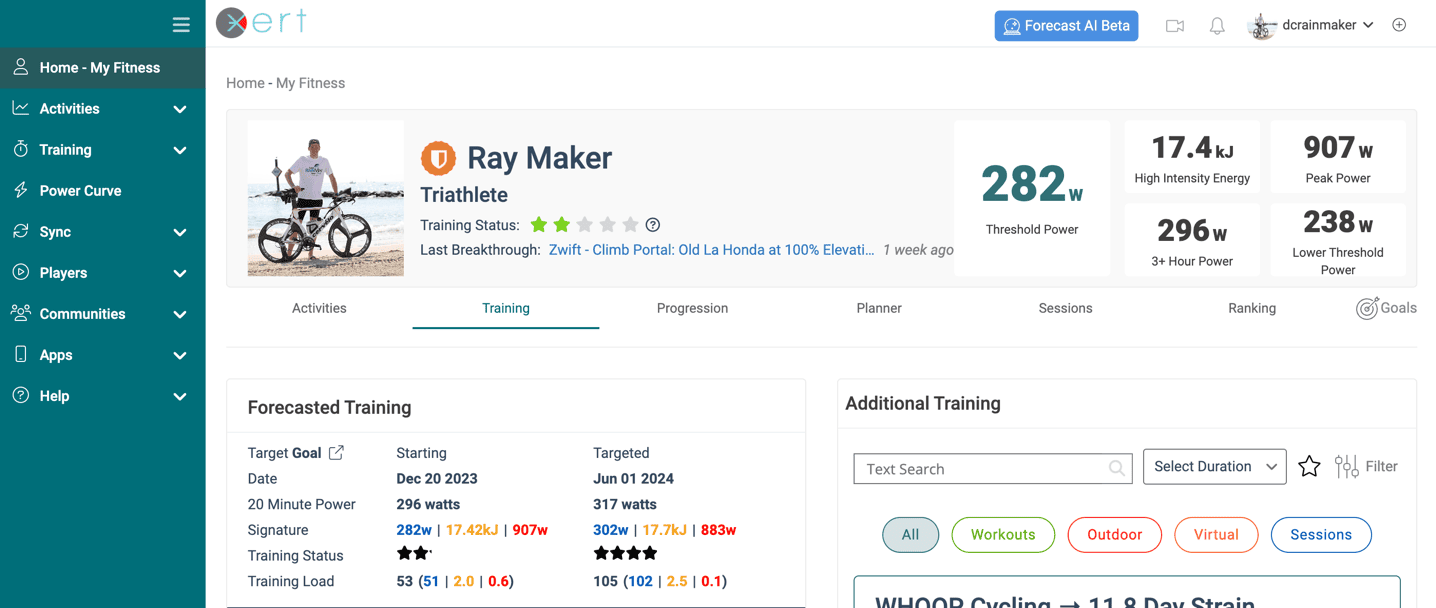
(Above: My dashboard, note in the specific above screenshot I took this after I started the beta, thus you’ll see the ‘Forecasted Training’ module shown’)
You’ll notice at the top a button that says ‘Forecast AI Beta’, go ahead and tap that, which brings you here. This is where you join the beta:
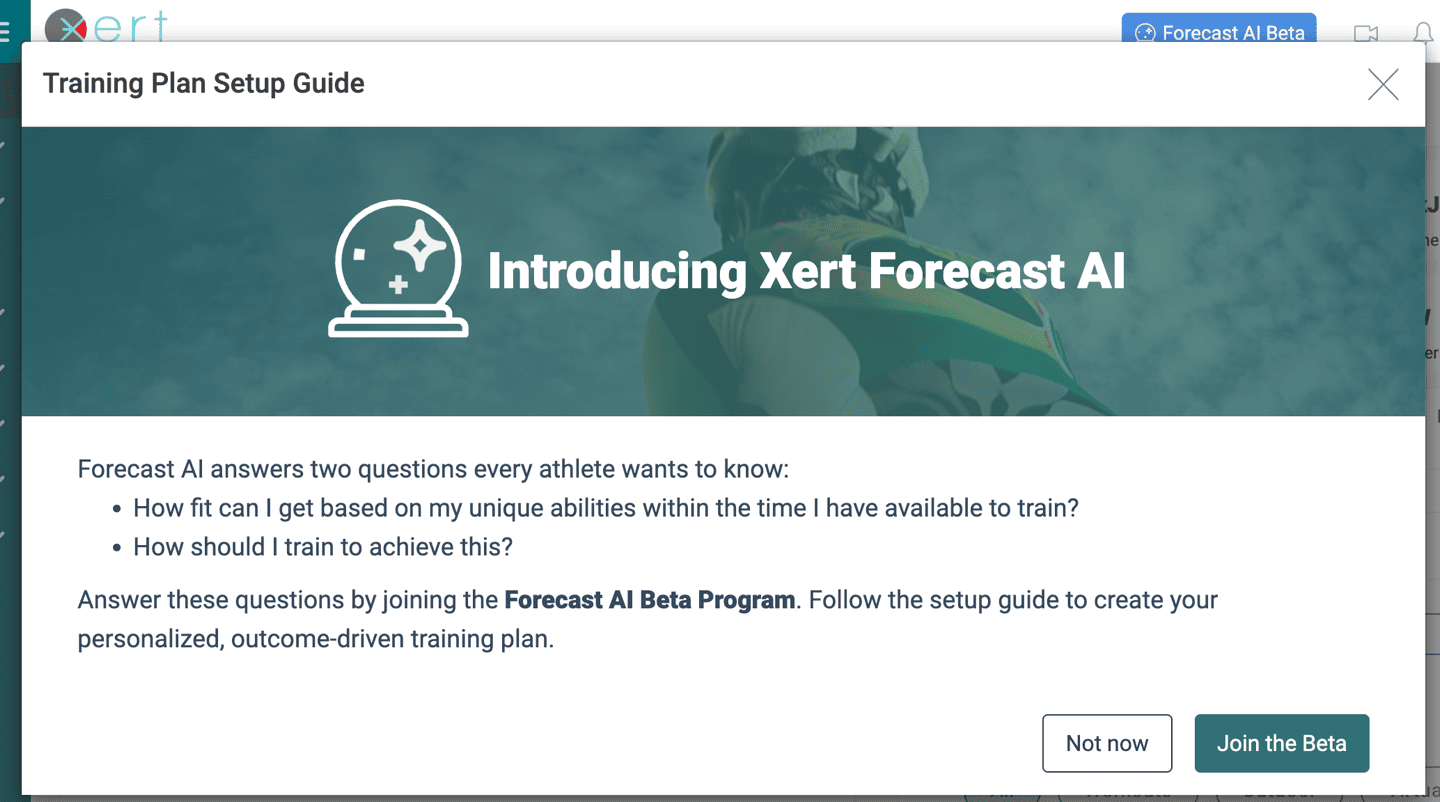
Next, you’ve got two options. The first option is where you define a specific target/goal power by a given date, whereas the second is where you choose a given event instead.
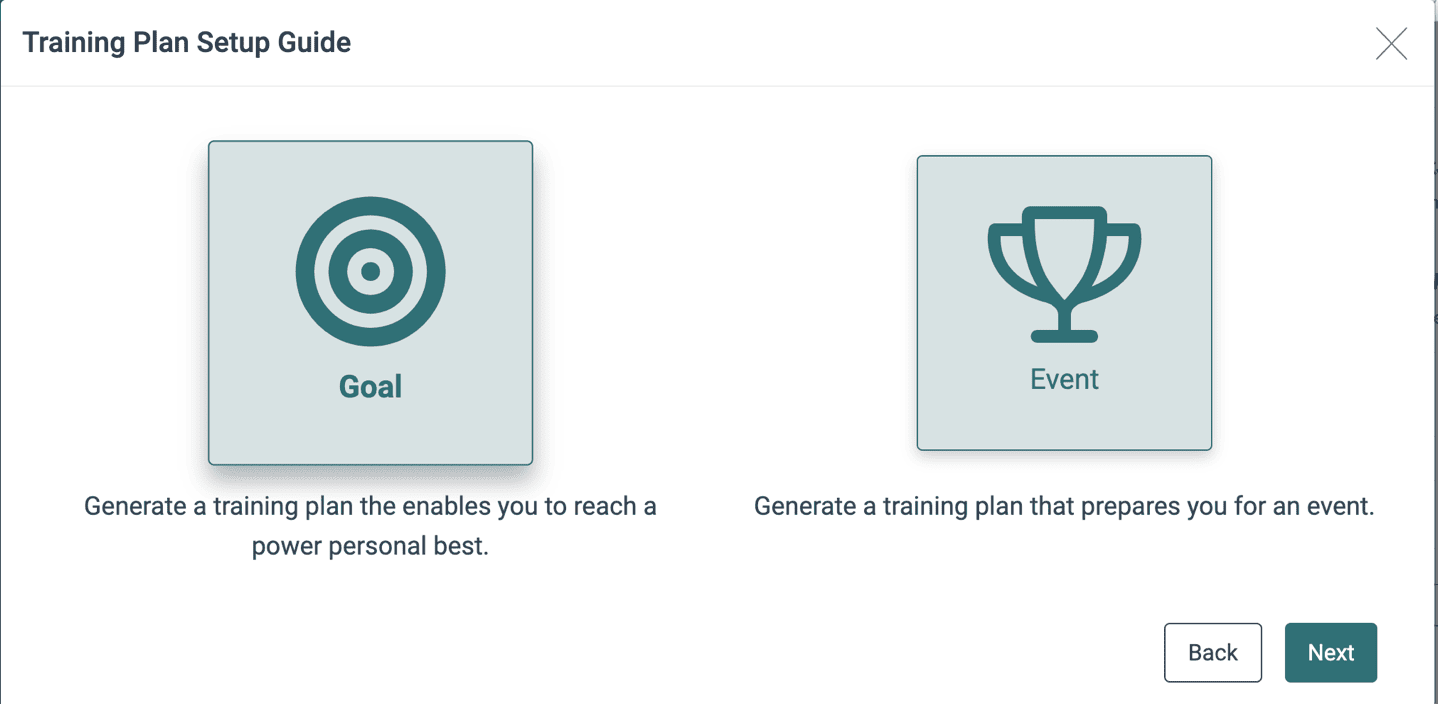
In my case, I selected the ‘Goal’ one, because I’m a simple-minded person who just wanted to try and boost their FTP ego.
Thus, brings me to this page. It has three sliders and a date box. I selected June 1st, 2024 as my goal date, and then started playing with the sliders. The top slider is obviously the one that matters in terms of the target maximum power, whereas the bottom two sliders are changing what type of riding you’ll be focusing on. As you do this, you’ll see it changes various numbers along the bottom. I do wish it’d just show the exact number below the ‘dot’ on the sliders, rather than having to look down below in the ‘Target Fitness Signature’. Note that if you change the ‘Focus’ type, then it’ll change the max power duration – such as shifting down to a very short duration for a sprinter (versus 20-minutes for TT).
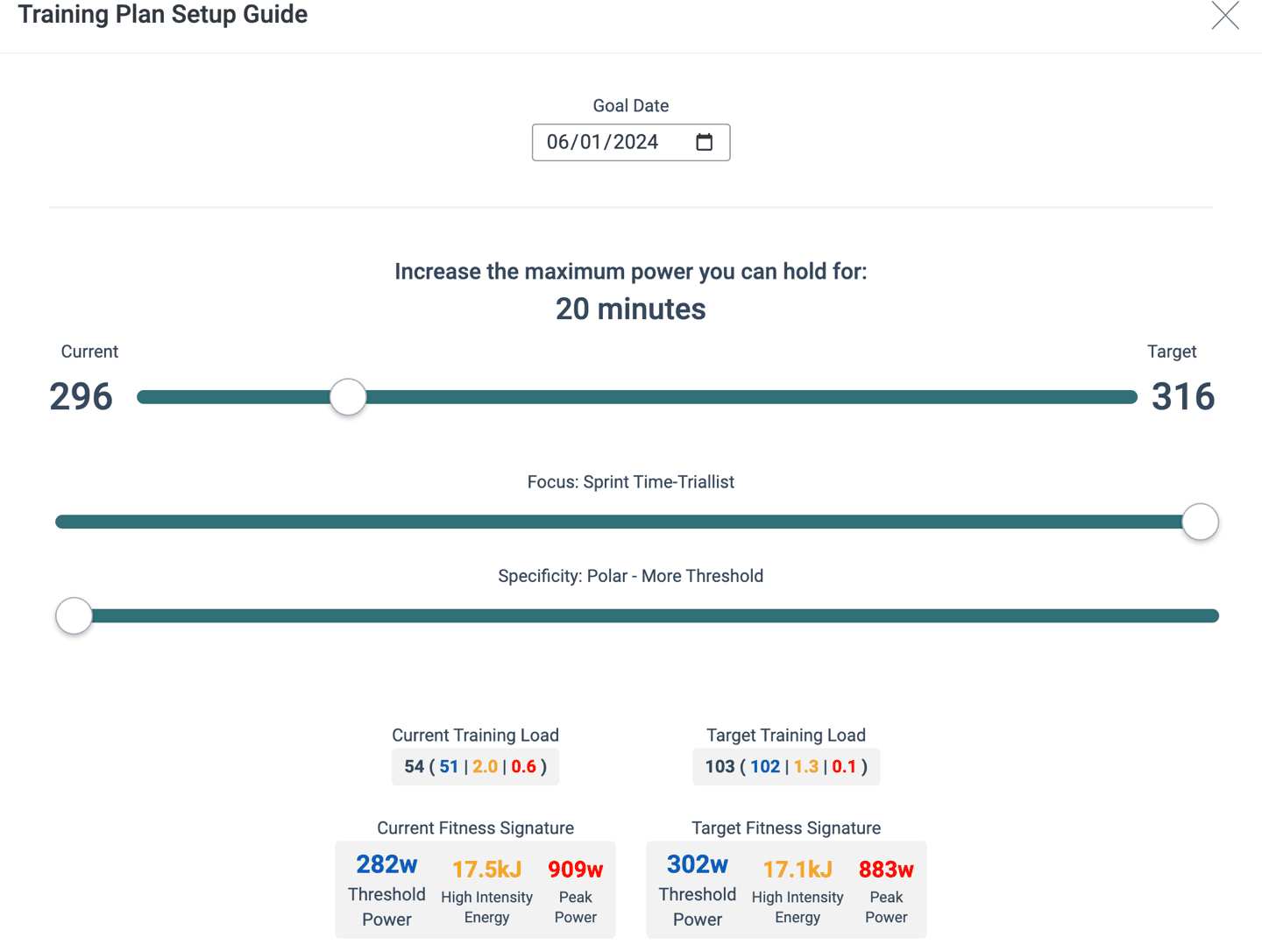
If you slide it too far to the right (as I did here to 334w), it tells you that you’re hallucinating:
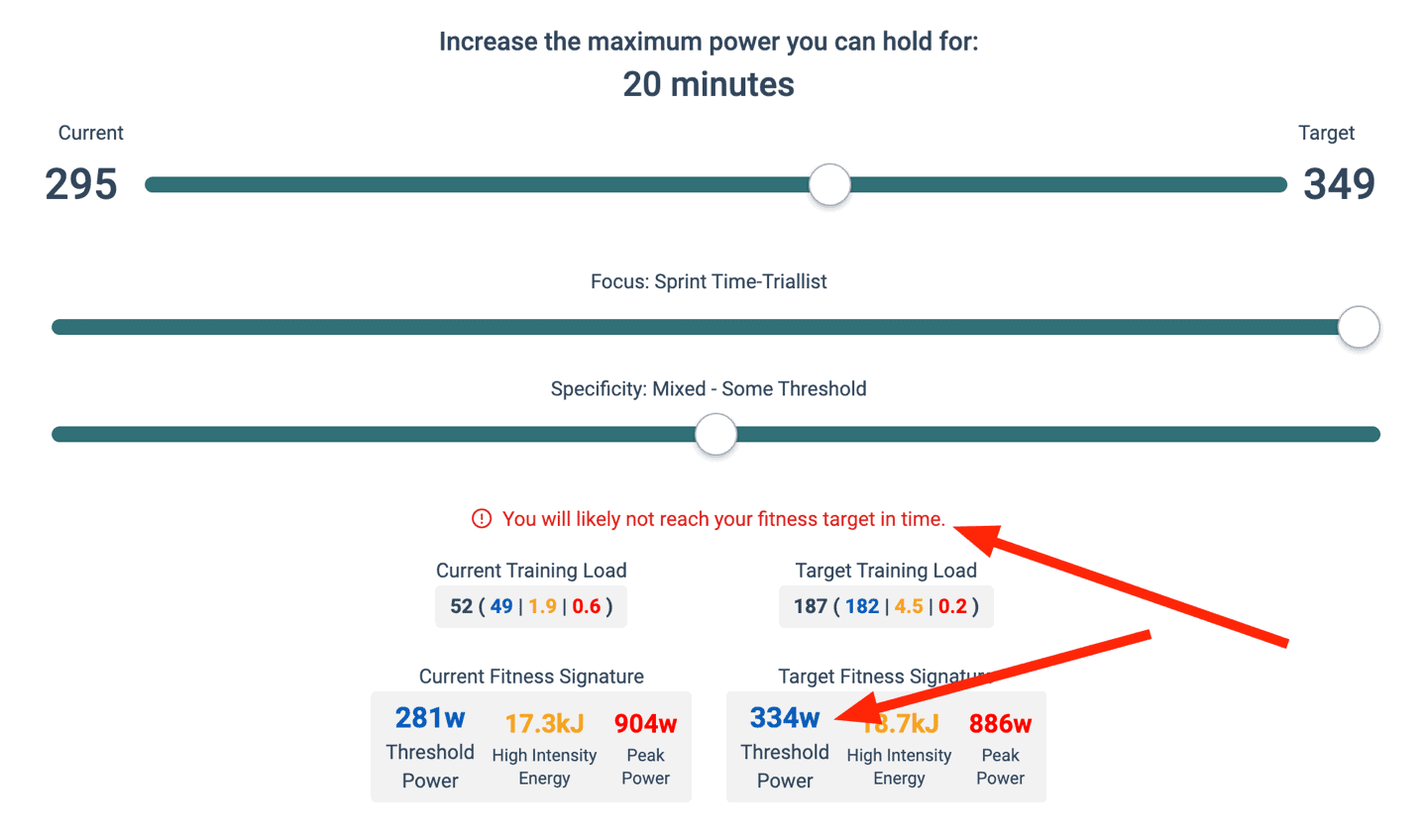
Now, once you’ve decided on a desired outcome (I’d select 316w in my case), it’ll start generating the training plan. It literally does this day-by-day in front of you. It’s like watching a screensaver. Here it is building out the month of January, showing the progress bar as well at the top:
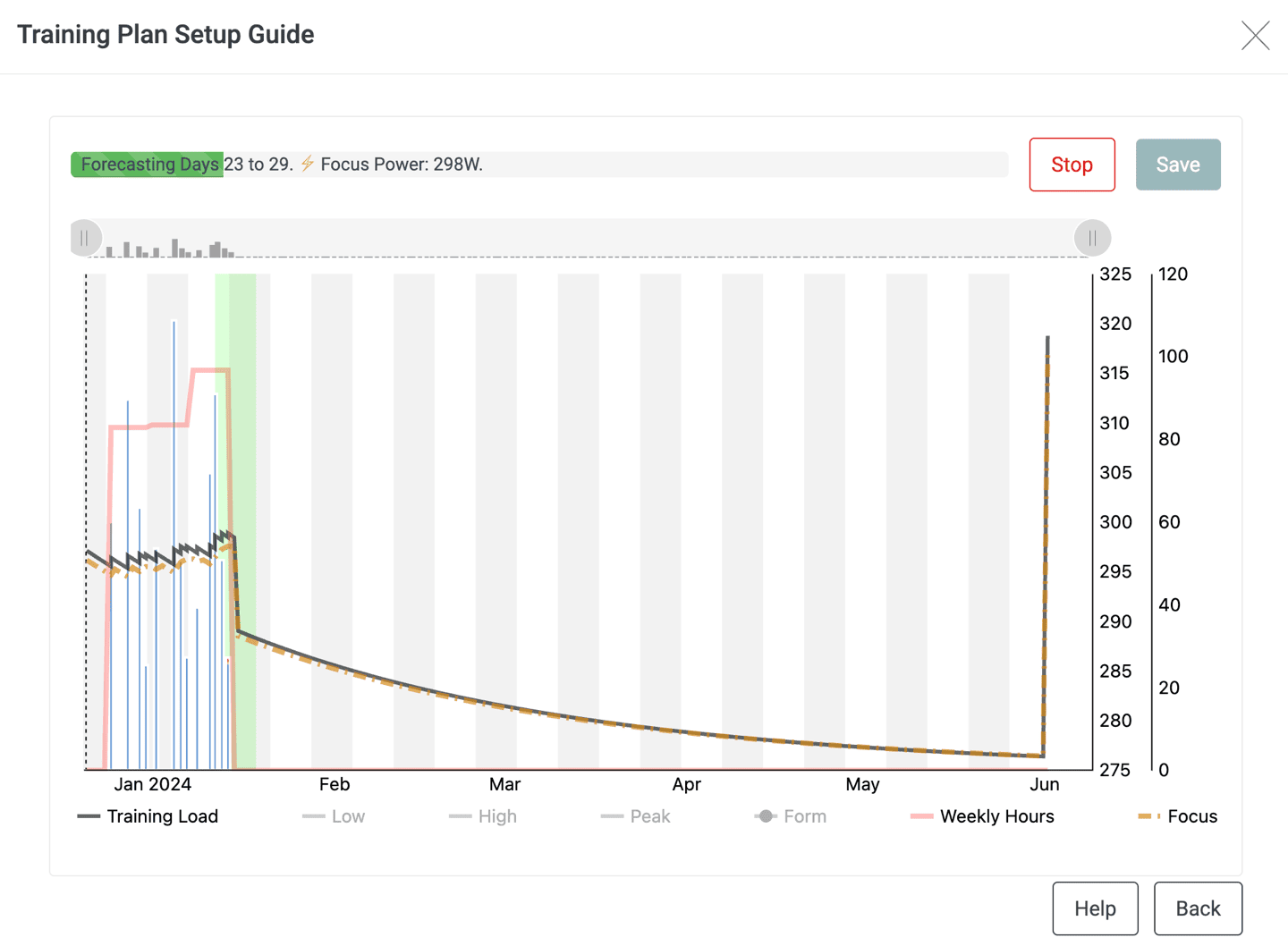
And then, a minute or two later, it finishes. You can see the entire next 5ish or so months built-out, and then your 20-minute power value listed as well. If you hover over any section of it, you can see the exact weekly hours shown for that week, as well as training load/etc.
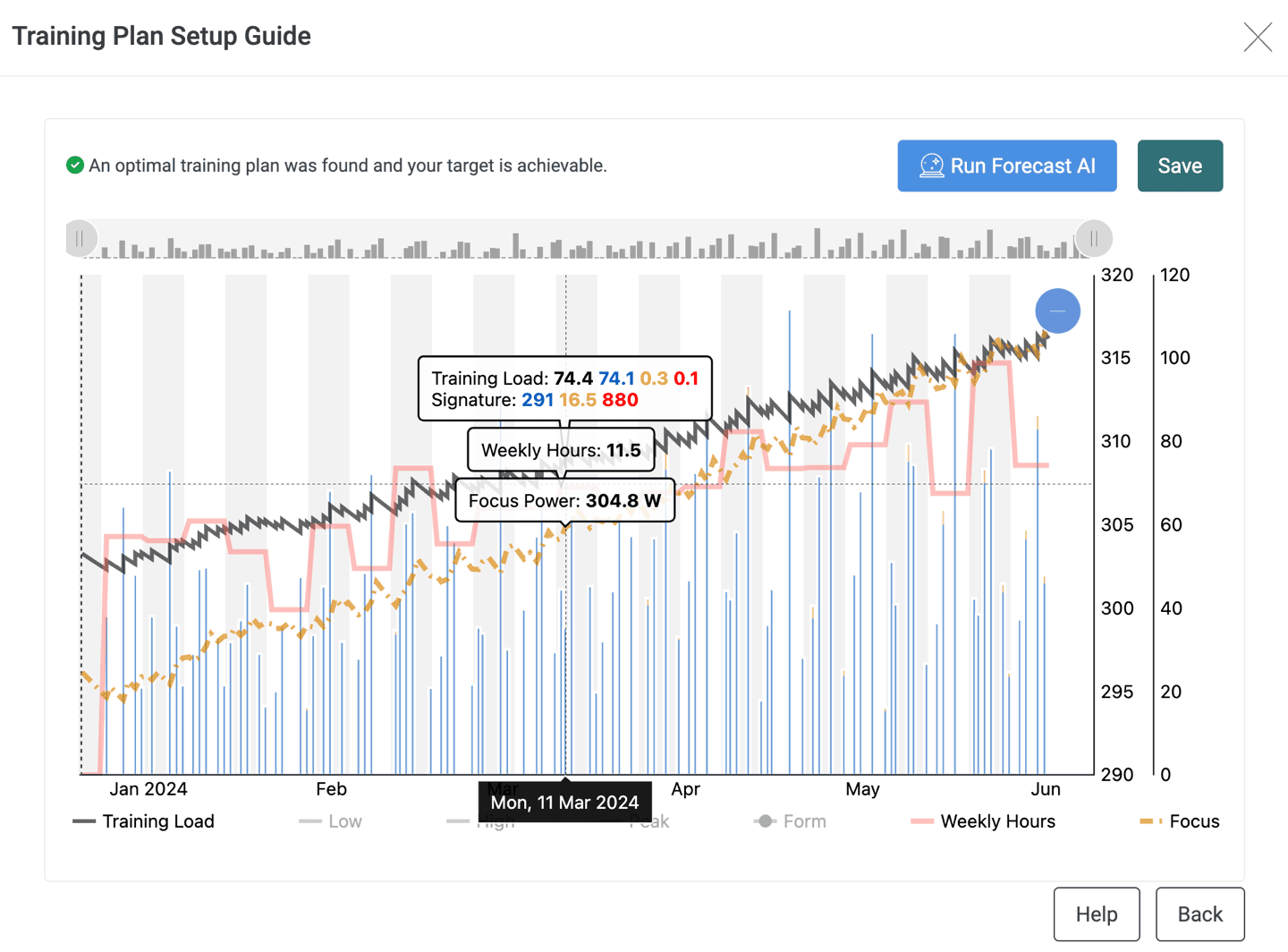
The allocated workout times and types appear on the calendar, however, not the actual workouts. Here’s a random set of a few weeks out in March. I will say that this seems like a bit of a quirkier schedule to have two back-to-back rest days, and then a cluster of three relatively higher volume days (but none higher intensity). Obviously, there are countless coaching methodologies out there – one of which is simply just a crapton of endurance-focused volume, which this seems to be aiming for.
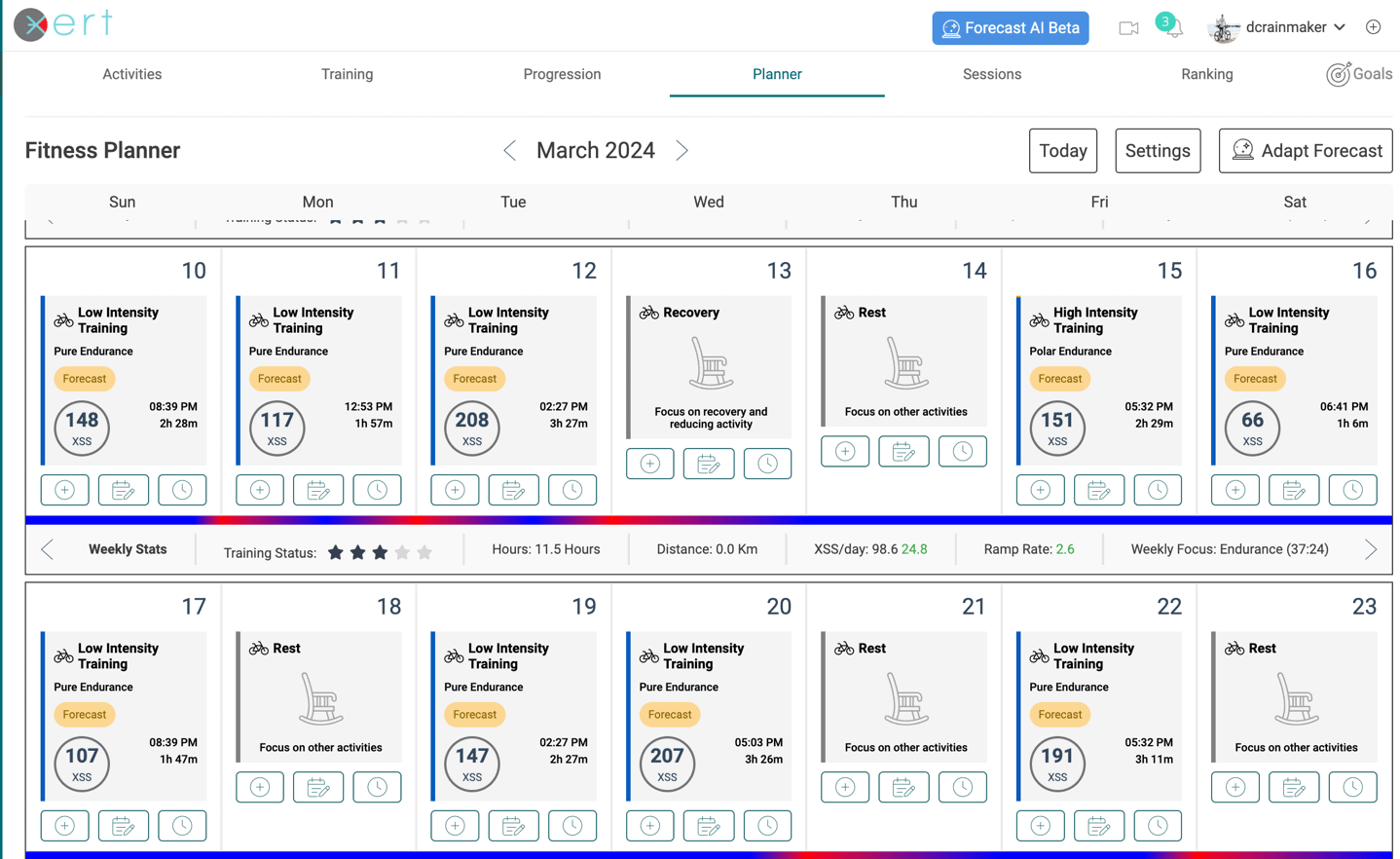
Now, for an actual workout to be selected, you’ll choose the given day’s forecast, and then select to assign various suggested workouts to that day:
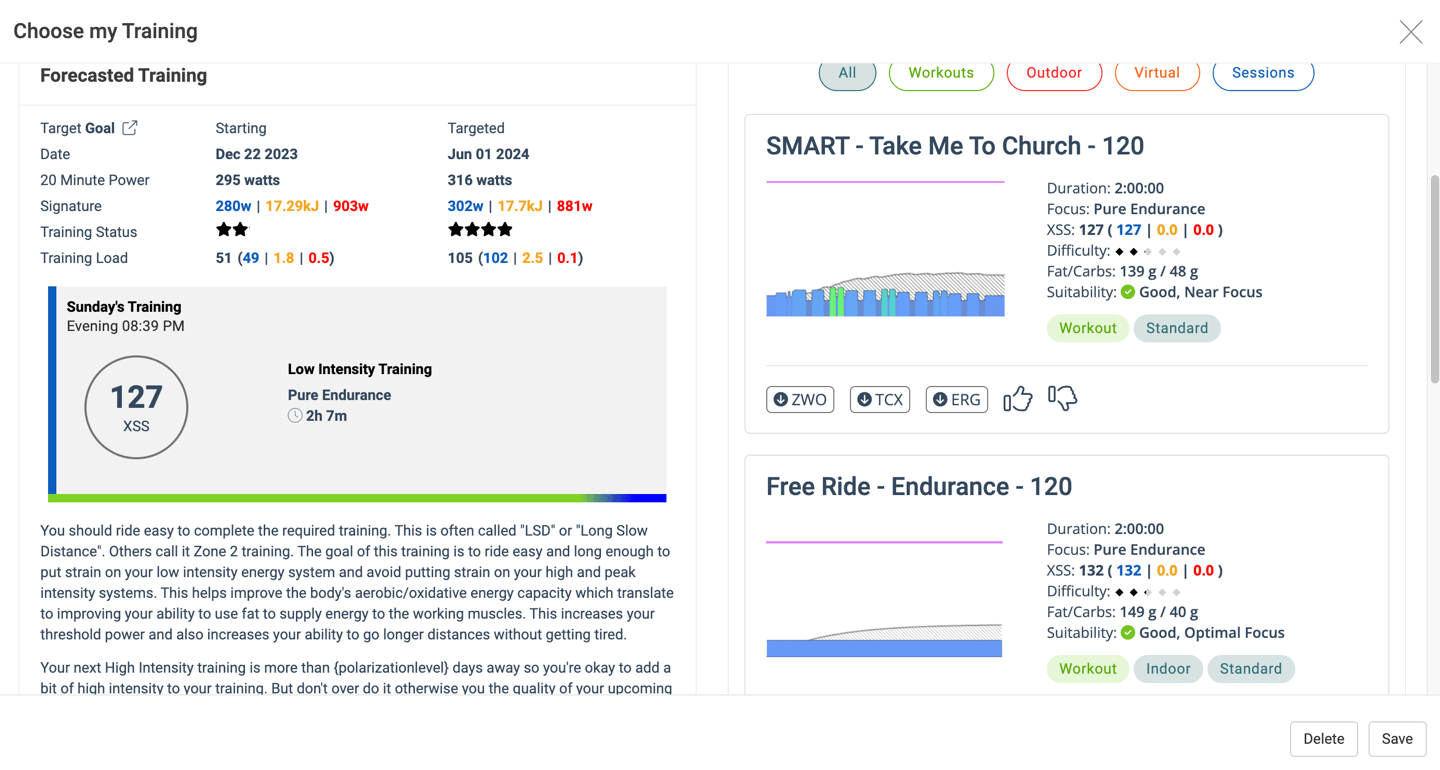
These workouts include everything from ERG workouts to video ones. It’s quite a mix of stuff. In terms of the act of choosing a workout though, this works fine. But honestly, I’m lazy. Just have it pre-assign the workouts, at least for a few weeks or up to a month out, and then if I want, offer alternate suggestions.
Still, I had more questions. Namely, what if I want to change the training time allotted per week? After all, as a triathlete, Xert doesn’t cover running or pretending to swim. So I need to schedule time for at least running. Thus in the above scenario where it’s got 11-hours per week on the highlighted week, that’s all cycling, not other sports.
Turns out the answer is ‘sorta’. You can choose any given day on the calendar (e.g. Monday), and then limit the amount of time on that day to a set number of hours. You’d then rinse/repeat this for the rest of the days in the week. I guess that’s fine, but honestly, I’d rather just say (for example) “Max 8 hours per week” – which I’d allocate to cycling, and then fill the rest in on running.
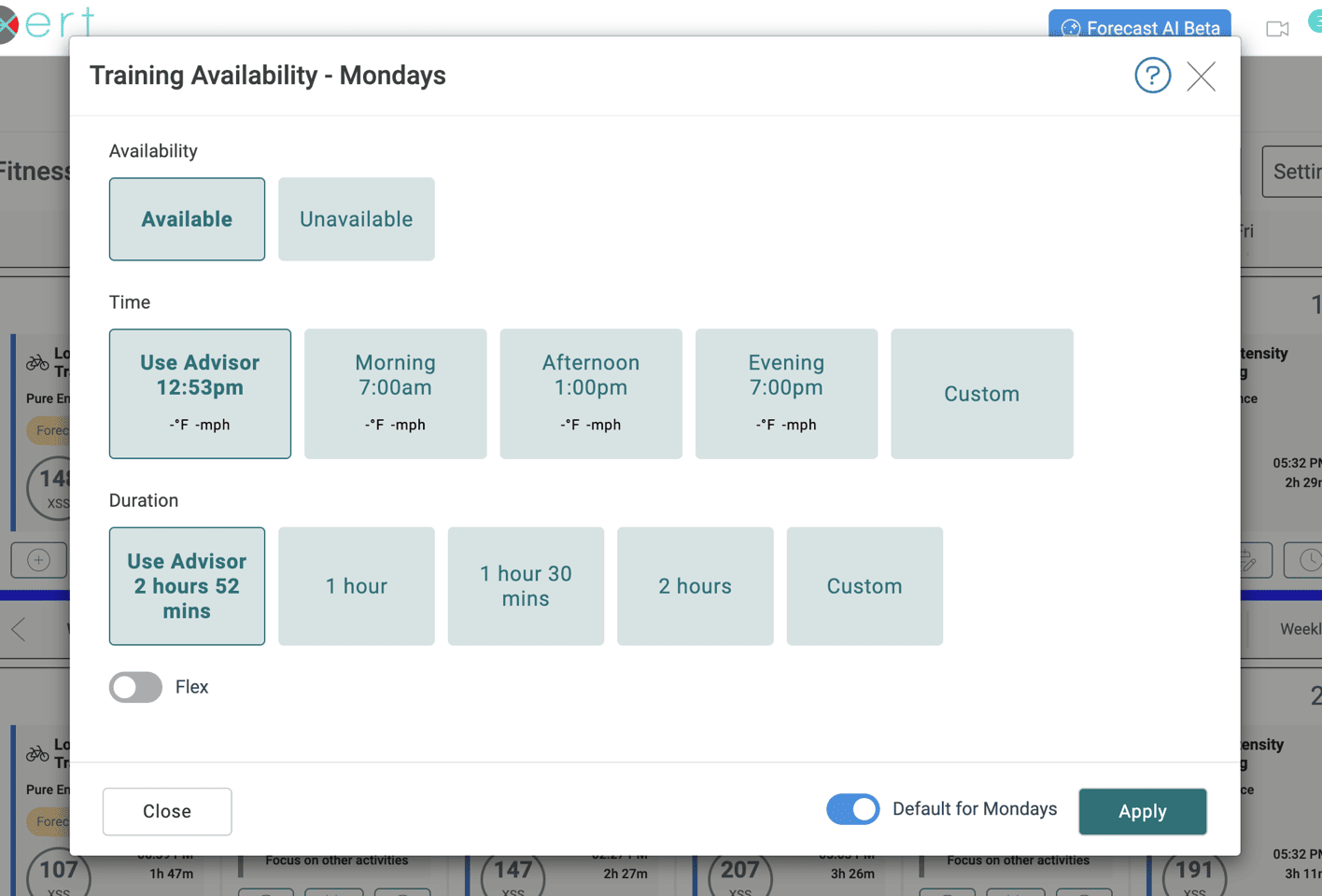
And then finally, what about that option earlier in the Forecast AI wizard to select an event? If you do that, you can choose the event duration and ‘type’ of event. Albeit, this doesn’t work super well for me as a triathlete, as those drop-down options at the top actually change the sliders down below (which you can’t change, except duration). Ideally there’d be a “Time Trialist/Triathlete” option, but also fully understand that’s not Xert’s direct target audience.
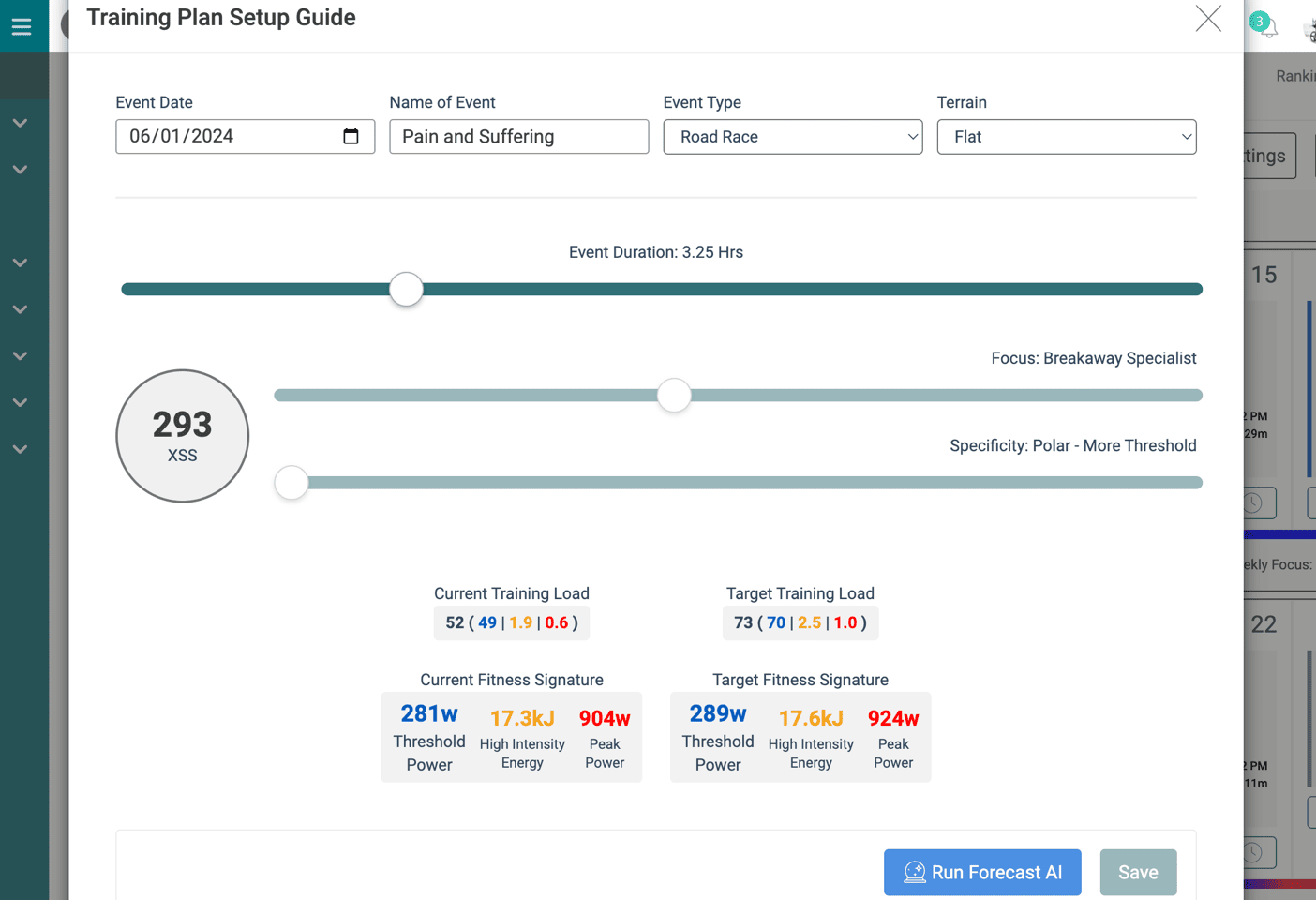
In any case, as noted by the term ‘beta’ on the buttons, this is all very much beta for Xert, but something they’ve been working on for quite some time. I saw it back this past spring initially, so it’s something they’ve been trialing for a while within their internal beta pool, and have now made available to everyone else.
Still, it’s a cool way of looking at ‘what’s possible’, and historically speaking, Xert has done a very good job at using algorithms to predict your max power values/durations during a ride; in fact, that’s literally the first thing the company introduced years ago. So it’ll be interesting to see as real-world people start using this, how well it does when scaling from a single ride – to a season’s worth of riding.
With that – thanks for reading!
FOUND THIS POST USEFUL? SUPPORT THE SITE!
Hopefully, you found this post useful. The website is really a labor of love, so please consider becoming a DC RAINMAKER Supporter. This gets you an ad-free experience, and access to our (mostly) bi-monthly behind-the-scenes video series of “Shed Talkin’”.
Support DCRainMaker - Shop on Amazon
Otherwise, perhaps consider using the below link if shopping on Amazon. As an Amazon Associate, I earn from qualifying purchases. It doesn’t cost you anything extra, but your purchases help support this website a lot. It could simply be buying toilet paper, or this pizza oven we use and love.

















I think I am first and I think this is pretty cool and interested to see how it develops. By the way, they did say at some point they would include running. Any idea with the progress on that?
Is it me or is everyone using the phrase “AI” to mean “we have a database and an algorithm”?
Question is who created the algorithm. If a human did, it ain’t AI. If a computer did, it is.
Humans create AI algorithms, I don’t understand why you think otherwise. AI is a way of searching through a large set of data, where a brute force search isn’t appropriate because of the size and therefore timeframes involved. This gives it an impression of “intelligence”.
Interesting use of AI ! I’m a developer.
They should also give the option to choose between Power and W/kg. If they allow to enter weight on a daily basis and adapt their calculations based on that that’s awesome.
I can explain why I think there is a need : let’s say it’s 1st January 2024, I weight 90 kg and my 20 min avg max power is 300W = 3.33 W/kg. If I give a Goal for July 1st at 350W = 3.88 W/kg it’s a different Goal than if I also focus at the same time on a diet to loose weight and reach form weight of let’s say 85 KG = 4.11 W/kg.
If it adapts the programs or goal (eg by saying after updating the weight from 90 kg to 89 kg : “You’re lighter, great job ! Your Goal of 350W can be increased OR the date to reach it can be reduced” based on the evolution of weight that would be perfect !
This is very interesting, but, as a master’s athlete, I wonder if overuse/injury potential is baked into the design. For example, I’m quite certain that I could – on paper (or in AI, or whatever) – achieve a higher FTP than I normally reach before my A events. That’s because my training volume is limited by my propensity to injure myself! So, I guess that a way to do this within the Xert beta tool is to pick the number of hours per week that you are willing/able to train and then determine if your future target FTP is whack or feasible. IOW, I could pick an FTP and a date, get the green light to aim for that and then say ‘limit my bike training to 8 hours per week’. Does the algorithm go back to check if the target FTP/date is still feasible with the training time limitation?
It does exactly this and there is also an option that athletes can adjust called “Recovery Demands” that tells the system to slow down progressive overload (or speed it up if you feel its too slow). By slowing down the maximum improvement rate, you’ll space out training and see a reduction in training volume overall. You can visually validate the setting by looking at the fatigue gradients on the calendar that get adjusted with the setting. The value should be tuned to your own sense of what you feel and if you’re concerned about overuse/injury, slide it further right creating greater recovery. Only caveat is that it will take longer to reach higher levels and you’ll run out of time in a week to achieve these higher values so you’ll be restricted in what type of events you’ll be able to successfully train for.
Ah, that’s great! And thanks, Armando, for responding. Very much appreciated!
is this Beta available for Trial Users?
Hi, I would be interested as well?
I think it’s not. It’s only in paid premium. I bought it and now I have it.
I’d be interested in knowing what testing they’ve done to show this works before paying for it, though at least they’re finally thinking from a user POV (they genuinely seem lost in a bubble there).
My experience with Xert on and off over the years has been that they have great ideas, but lack execution, and polish. They also miss on the psychology behind training, entirely failing to make it all interesting through something as simple as variety.
Always had better results just training myself. I’d love them to pull everything they want to do off one day though – reckon they need cash and a larger talented team. Neither especially easy to acquire for such a niche so fair play to them for grinding on with the mission. I do prefer Xert over TrainerRoad – something earnest about Xert’s effort that I appreciate. TR was always very cookie cutter with an almost Apple like distortion field generated from its ease of use and ‘scientific’ (read cherry-picked) examination of training studies on the podcast.
Okay well enough of this weird rant – will check Xert in Jan and maybe give this a spin to see how well it works out.
I like the idea behind this and the general execution. If Xert can nail this, then they really have a strong offering that creates a lot of value for athletes (and has a lot of room to functionally evolve).
As pointed out by Ray and others it would really be nice, though, to be able to (easily) define a time budget and use this as a constraint for the optimization problem the algorithm is solving. Otherwise, the result can be a bit trivial. For me it basically says that to increase my power target I need to substantially increase my training volume. Now, clearly this is likely to be a valid answer. But it is also the least interesting answer. What would be more relevant to me is to understand whether I can reach my power target within my time budget through actual optimization of my training. It would be great if Xert could give me that answer (or maybe even show me different ways to reach a given goal and their likelihood of success given the overall data pool).
A bit connected to this is that Xert does seem to have a strong tendency towards lots of base training. Again, certainly a valid way. But it would be nice if I could choose the style to better match what motivates me. For some that may be long endurance sessions, for others it will be Zwift races and for yet others some combination. Yes, you can always deviate from the training plan (and ideally the algorithm will find a way to adjust), but it would be nice to have some control over this.
Thanks Max.
You can define your daily availability (either on a day of the week or on a per day basis). Just constraining number of hours per week doesn’t really help since those hours could be anywhere. Help by describing your availability and it will figure it out for you.
As far as base training, there are a couple of under the cover settings you can control to manage this. Polarization Level in the settings lets you define the ratio of low intensity to high intensity. The default is 4:1 but you can reduce it to 1:1 if you want more high intensity. (Challenge will be that you can’t ramp up as quick but that’s another story). You can also change the Periodization Level. Lowering this will give you high intensity throughout the plan. Increasing it waits until you get closer to the event to build.
The AI engine will map it all out for you when it generates the training plan.
Xert is one of the tools I use every week and have done for years. Definitely worth a look. if it modelled the fitness/fatigue crossovers from running/cycling, it would probably become my main tool rather than one I look at to assess some performances and some aspects of progression.
I’ve played with the AI a bit (but not as much as Ray) and was using a workout from it last night on the KICKR as it happens. I’ve also used a few other tools that purport to be AI (some of which aren’t AI/ML!)
What I like about the Xert training tool here is that it gives me a variety of ‘interesting’ workouts to choose from, other tools can be blandly prescriptive in their suggestions. Also the workouts use Xert’s SMART recovery to model the required recoveries between EACH interval before the workout starts and then further adjusts those rests based on your modelled fatigue after you complete the preceding interval – I’m finding that interesting right now as I’m looking at muscle oxygen…the Smo2 sensors assess recovery by measuring it in some fashion whereas Zert is modelling it mathematically. Most other platforms don’t address these issues at such a granular level
as an interesting PS.
AI Endurance shows how its model historically performed against what you actually achieved. That kind of chart gives you confidence in the tool going forwards. I didn’t check if Xert did that yet??? I don’t think it did from memory, I could be wrong
This is my main concern too: why on earth different sports live in silos when IRL they have huge crossover impact like you said.
That said, how do you use SMo2 data for recovery (with/without Xert)? Is there some decent resource for learning more abt SMo2 as I’ve been pondering if I should get one.
My main concern with is the missing native integration with Garmin as I am already running out of CIQ slots, and it’s my main frustration with Garmin! How do you get past these sensor limitations or do you use different brand?
the issue with running and cycling is a real one and xert doesn’t want to make up an answer #Kudos, Armando knows his sports science and if there was a ‘correct’ answer he would have had it working a while back
.
If you get a 5k pb one day..how exactly does that impact your ability to get a cycling FTP best the following week? Tricky
My guess is that that are many subtle variables that add up to make a messy picture. eg your running gait could stress you out differently to someone else. those differently stressed muscles might then be used by each of you differently when cycling.
Even though it is complex I would have thought it is PRECISELY the sort of thing that AI should be able to solve where all else fails. The AI/ML model would be personal to you and your history.
for SmO2 recovery I was thinking specifically over recovery between intervals during a single workout. endurance/max.strength/hypertrophy goals require different kinds of recovery each to different levels of SmO2. I’ve linked to my review of Train.Red (click on my name on this post), hopefully Ray won’t mind as he hasn’t yet written about train.red tho I believe he owns one.
CIQ: there are more CIQ slots with Edge than the two with watches. Yes, it’s a massive limitation. no workaround afaik. some DFs might combine two features you want in one DF
What I’ve been looking for, and it’s something that I don’t think anyone is currently offering, is a hybrid approach of free-rides and workouts.
I’m not a competitive athlete (though I’m always looking for ways to improve) and am not going to follow a structured training plan of the type where each day you go out and follow a prescribed workout for the day. What I’d like to see is something that allows you to ride however you want some days during the week, and then it analyzes those rides and dynamically creates/assigns specific workouts for upcoming days. These “proposed” workouts would be volatile and change every day you complete a ride (whether a free-ride or a workout).
In other words, something that can say “it looks like you’re not doing enough anaerobic work so based on your recent pattern of training and your current training load here’s an anaerobic workout to do tomorrow that won’t push you over the edge.” If the next day you do something other than the suggested workout the system would re-analyze and offer an appropriate workout for the next day (and so on).
We’re probably not quite at this level yet, but I keep hoping that it’s coming soon.
Fully agree. That would be ideal. In a perfect world also include any runs you have been doing. So essentially like a real-world coach who knows all your data by heart.
That’s exactly what Garmin suggested workouts are supposed to do.
“What I’d like to see is something that allows you to ride however you want some days during the week, and then it analyzes those rides and dynamically creates/assigns specific workouts for upcoming days. These “proposed” workouts would be volatile and change every day you complete a ride (whether a free-ride or a workout).”
How is that different than how Xert works now?
It’s been two or three years since I’ve used Xert, but from what I remember don’t you have to have a target event entered?
Also does Xert take individual physiology into account? Athlete age, athlete specific changes in heart rate while performing different efforts? How about rest and recovery? Does it analyze the sleep you’ve had the previous night and how much rest you’ve had over the past several days? Does it know how you typically recover after different types of workouts? For instance, does it analyze HRV (short term and long term)? How do efforts of certain type affect HRV and therefore impact the ability to perform the next workout? How might the suggested workout impact recovery and is that impact acceptable based on the athlete’s typical training schedule?
These are just simple examples, but it’s not hard to imagine other ways of analyzing data commonly available to further inform a workout suggestion.
There are also more types of sensors becoming popular (body temperature, SmO2, glucose, maybe lactate soon). Most athletes would only have a subset, but ideally the AI would use everything available to figure out what the best workout is for the specific athletic at a specific point in time.
Garmin workout suggestions are too much of a black box to inspire confidence.
Also I’m not entirely convinced that some of the data Garmin presents in Connect is accurate or valuable all the time.
I also use Whoop (I use the bicep band 24×7) and while Whoop isn’t perfect it seems to have the best algorithms around right now and I give it much more weight than Garmin.
True – but there are probably more ‘pure’ cyclists than cyclist / runner or tri-athletes.
From a market perspective, it does probably leave them enough room.
Love what they do – especially the comparison with the past !
Well done and thanks for the article.
It is a pity that Xert has a rather critical issue. It seems to be impossible to make an account, sorry, I mean to login to an account after registering. I have tried multiple times without success. Would have been fun to test the features described here.
I’ve been an Xert user for the last 4+ years on and off.
In general, it’s good! But, as you point out Ray, it struggles a little for us triathletes who want to block days out in the the diary to do the pesky swimming and running pieces of the puzzle.
Playing around with the New AI (and this is likely why it’s Beta) it REALLY struggles with re-claculating a training prgram once you start limiting time on certain days of the week.
I tried to spoon feed it, by just limiting one day at a time and that worked, to a point. After eliminating Monday and Weds workouts and limiting Thursday to 1.5 hours I then tried to eliminate Friday workouts, assuming it would slide overage from Fridays into Saturday (which I left unlimited for training time on >4 hrs and Sundays which I limited to 1.5 hrs.) Nope!
Did not compute.
I KNOW it’s possible to get to a 300W FTP on Tues 1.5 hr/Thurs 1.5 hr /Sat (long up to 6 hrs)/Sun occasional 1.5 hrs scheduling as I’ve done it many times and years in the past.
As well as failing there’s a usability (and AI compute time – which isn’t cheap) issue here.
The way this works right now you have to use the AI to schedule BEFORE you put the time limitations in. This is an ass-backwards way of doing it as…
1/ the AI has to recompute each time you put in some limitations (and doesn’t always figure it out to a positive outcome as outlined above)
2/ It’s just a PITA from a user perspective
Much better to ask the user to put in their calendar limitations FIRST then compute the way to hit the goal using AI. That way there’s only one iteration needed – not 7 (one for each day of the weeks limitations).
I’m guessing Beta testing will include some of this type of feedback to help make the AI more sucessful and the interface for doing this alot more user-friendly.
That said – if Xert can get this right it would be a real boost to what is already a pretty good product.
Yup. Lots of changes rolled out today.
Great news Armando, I’ll take another look 👍
I enjoy your videos